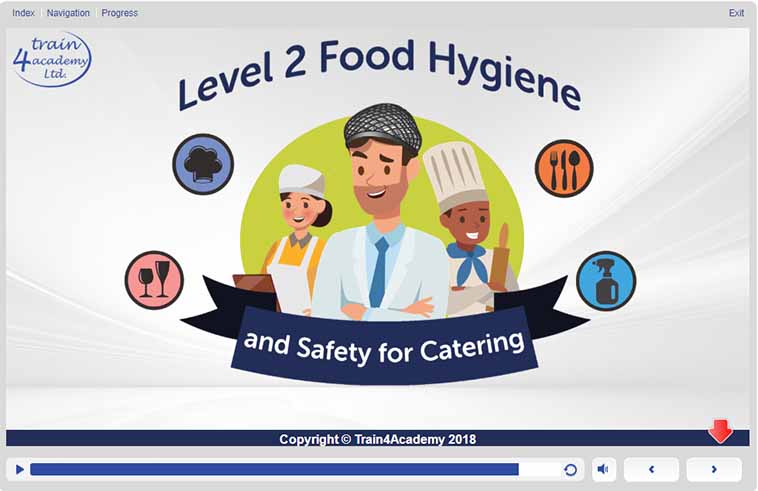Why is Food Hygiene Important in Catering?
04/11/2019
This article looks at the importance of implementing and maintaining food hygiene practices by catering businesses, however small. It is for anyone who handles food at any point of the process from production to service. It is designed to give you a good introduction to the importance of food hygiene when working with or handling food safely.
Why good food hygiene practices are important in catering
As food producers or food-handlers, everyone must be aware of the dangers posed by eating contaminated foods that can cause foodborne diseases. These can range from unpleasant symptoms such as diarrhoea and sickness to a more serious infection such as those acquired from E. coli O157, which at worst, can cause death.
It is critical in catering as all food handled, prepared and served, must be free from any food safety hazard, which may cause physical injury, food poisoning and become dangerous to the consumer. According to the World Health Organization (WHO):
"An estimated 600 million - almost 1 in 10 people in the world - fall ill after eating contaminated food, and 420,000 die every year, resulting in the loss of 33 million healthy life years (DALYs)."
Find out more about our Food Hygiene Level 2 online course.
What is food hygiene?
Food hygiene is an essential element of the overall term of food safety. Those who work directly with food have a legal duty to have the required level of knowledge for their role. For example, the processes that are directly linked to:
- Cleaning
- Cooking/holding
- Storage
- Preparation
of food. Some of these essential procedures for keeping food safe are:
- Cleaning procedures - such as cooking equipment, utensils and cutlery, plates, premises, kitchens to control chemical and bacterial contamination
- Cooking/holding temperatures - these must be appropriate to ensure food is thoroughly cooked and held to prevent the risk of bacterial contamination
- Storage - Food must be stored in safe, hygienic containers in allocated locations, at the correct temperatures. This includes using the FIFO (First In, First Out) system and correct labelling
- Allergen control - those who handle food, must know the most common allergens. This knowledge will help food-handlers to understand how allergens should be processed and stored away from other foods to avoid cross-contamination
Kitchens are places where bacteria and germs can multiply readily in the right conditions, increasing the risk of contamination and cross-contamination, which is a major cause of foodborne illnesses caused by bacteria such as Salmonella. For example, if raw uncooked meat comes into contact with ready-to-eat foods, the bacteria on the meat will contaminate the clean, ready-to-eat food.
Equally, cross-contamination of allergenic foods to non-allergenic food can occur with poor storage and hand hygiene. If those who have an allergy to certain foods (allergens) can become ill should they consume the affected food. On rare occasions, it can be fatal.
Who is responsible for good food hygiene?
Everyone involved with food has a responsibility to ensure high standards are maintained to keep food safe from contamination and cross-contamination. Catering business owners have a legal obligation to comply with various legislation including:
- Food Hygiene (England) Regulations 2013
- Regulation (EC) No. 852/2004 on the Hygiene of Foodstuffs
And others to ensure food safety is implemented and maintained throughout the process. They must ensure that all staff are trained to follow best practice in food safety, relevant to their roles. Supervisors have a responsibility to oversee that the relevant training is offered and undertaken accordingly.
Consequences
The consequences of not following high standards of food hygiene practices and procedures can result in illness or injury to a consumer. Where a business fails to follow best practices or to comply with the standards set out by the Food Standards Agency (FSA), this could lead to expensive legal prosecution.
What does best practice include?
Following best practices, is most likely to contribute to a high level of good food hygiene, customer satisfaction, which can lead to high consumer confidence. It can also be used as a due diligence defence should a problem occur.
The 4Cs of food hygiene
Learning and using the 4Cs of food hygiene effectively can help avoid the most common food safety issues. These are understanding the importance of:
- Cleaning
- Cooking
- Chilling
- Cross-contamination
Other factors for ensuring safe food is to follow best practice for the following:
- Storing food
- Delivering and transporting food
- Staff training to include personal hygiene, behaviours and effective hand washing
Further Resources
Food Hygiene Courses
- Work towards compliance with UK & EU Food Safety and Hygiene Legislation
- Accepted by Local Authorities
- Unlimited resits at no cost
- Instant certificate
